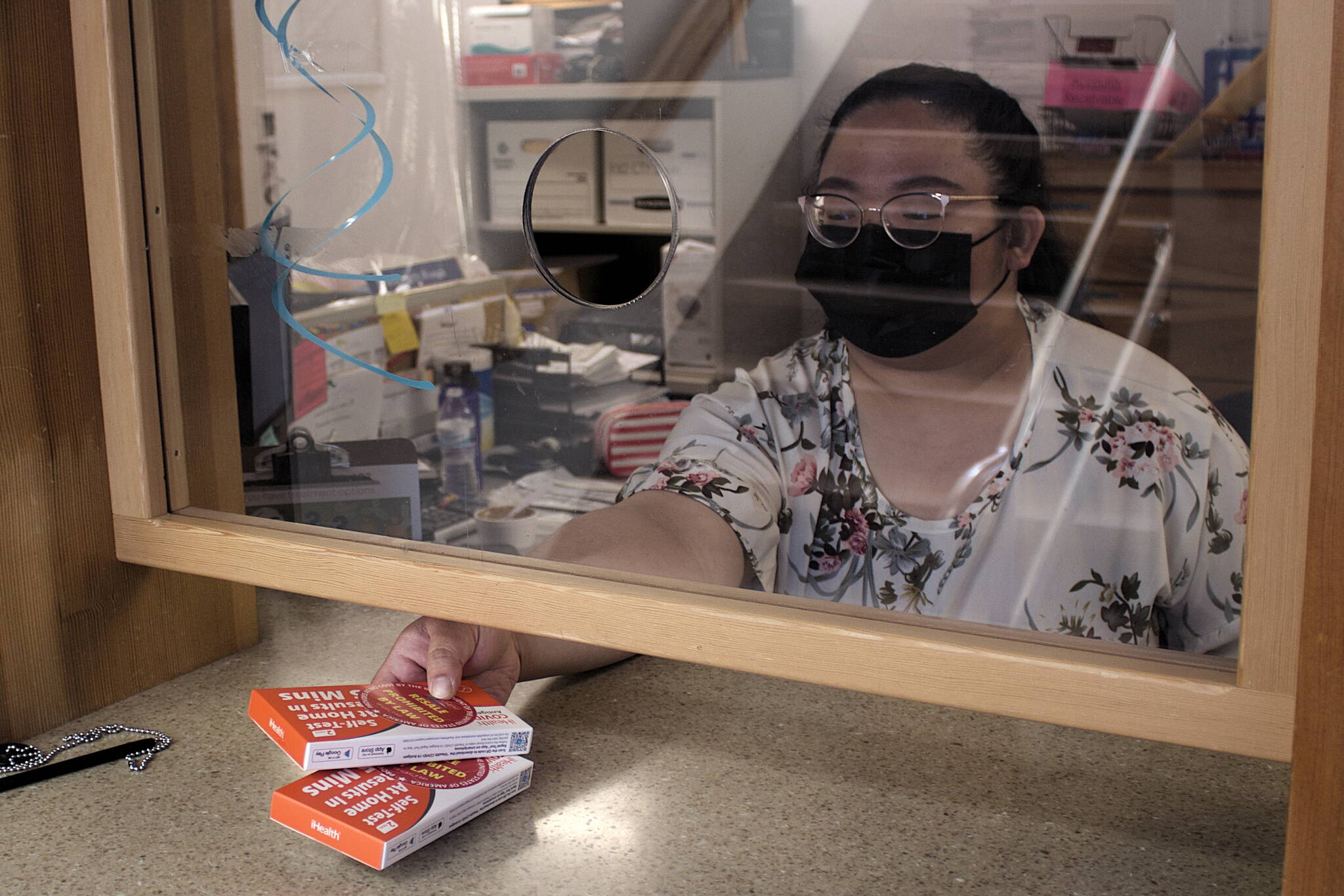Free COVID-19 self-tests are again available from city government locations at perhaps an ideal time due to a surge in local cases that are mostly unreported, with large events such as Celebration and Juneau Gold Rush Days likely to contribute to the spread, according to officials.
An upward trend in local cases that began in May is essentially holding steady in June, with a total of 151, 145 and 140 cases reported during the past three weeks ending Wednesday, according to Centers for Disease Control and Prevention’s COVID-19 dashboard. The city’s risk level remains at medium, the same as the past several weeks, although the per-100,000 case rate of 402.9 during the past seven days is technically a “red zone” level.
While those figures don’t match large fluctuations seen in May, which ranged from 119 cases the first week to an outlier spike of 356 cases mid-month, the dashboard doesn’t tell the whole story because of an increasing trend of cases not being reported, said Bartlett Regional Hospital infection preventionist Charlee Gribbon.
“My general sense is there are three to five times more cases than are being reported,” she said Thursday. “Of every one to two people getting diagnosed, four to five are staying home and getting an antigen (self) test.”
In real terms that means “we are definitely seeing an increase in cases over the past couple of weeks,” Gribbon said. But “I wouldn’t really be able to say how much of an incline we’re on.”
One indicator is the hospital has generally had about 11 to 12 employees absent in recent weeks due to testing positive for COVID-19, but the current total is 17, she said. The highest total since the emergence of the omicron variant is 22.
However, the availability of self-tests is an overall positive in terms of people being aware of their status and acting appropriately as they increasingly resume normal routines after 31 months of coping with COVID-19, Gribbon said.
“The majority of people have good intentions and want to do the right thing,” she said.
Besides the thousands of daily cruise ship passengers who are an obvious factor, Gribbon said large events such as Celebration are inevitable contributors even though measures such as vaccinations and face masks were required at indoor events. No such mandates will be in place at Gold Rush Days this weekend. Several thousand people are expected to participate in the outdoor event.
“In those situations it’s still a good idea to wear a mask,” Gribbon said, noting that while they’re not 100% effective at preventing the spread of COVID-19 the likelihood and severity of transmission are significantly reduced.
More masks
The city has received another shipment of 19,000 rapid antigen self-tests from the federal government, and expects another 5,000 to arrive “in a day or so,” said Denise Koch, the city’s deputy director of engineering and public works. The tests are available free at all Juneau Public Libraries, City Hall, the Juneau Police Department and the Juneau Public Health Center.
“It’s an honor system,” she said, noting there is no set limit of tests people can request. “We just ask that people use them judiciously.”
The supply of tests is expected to last until the end of July and possibly well into August, “depending on how many people pick up the tests,” Koch said.
Up to three orders for free tests per household can also be placed by visiting www.covid.gov/tests or calling (800) 232-0233.
Laboratory testing is also still available at Bartlett, SEARHC and Juneau Urgent Care. The tests are generally available free, but insurance information may be requested and the city advises inquiring about any potential fees.
A factor that could eventually affect availability of testing and services is the Alaska Department of Health and Social Services is scheduled to rescind the state’s public health emergency order for COVID-19 on July 1. Federal reimbursement of spending related to the virus is also scheduled to change on that date from 100% to 90% with a 10% state match.
Adam Crum, the state’s health commissioner, said in a news conference earlier this month ending the emergency order shouldn’t have a noticeable effect for residents, and that weekly reporting of cases and availability of necessary services will remain available.
But the order will, for instance, end eligibility of extra SNAP benefits for the more than 56,000 households in the state as of the end of August.
The federal government’s COVID-19 public health emergency is scheduled to end in mid-July, but an extension by the Biden administration until at least this fall is widely expected.
Ending the state and possibly the federal emergency declaration shouldn’t impact Bartlett’s ability to provide drive-through COVID-19 tests for the foreseeable future, said Erin Hardin, the hospital’s community relations director. She said in part that’s due to ensuring people with health plans who can pay for the tests are doing so.
“If you have insurance your insurance provider pays for it,” she said.
Koch, who said the city has received and distributed a previous shipment of self-tests about the same size as the current one, said additional tests will be requested as long as they are available.
“We will continue to provide these antigen tests as long as the federal government is willing to reimburse us for them,” she said.
• Contact reporter Mark Sabbatini at mark.sabbatini@juneauempire.com.

